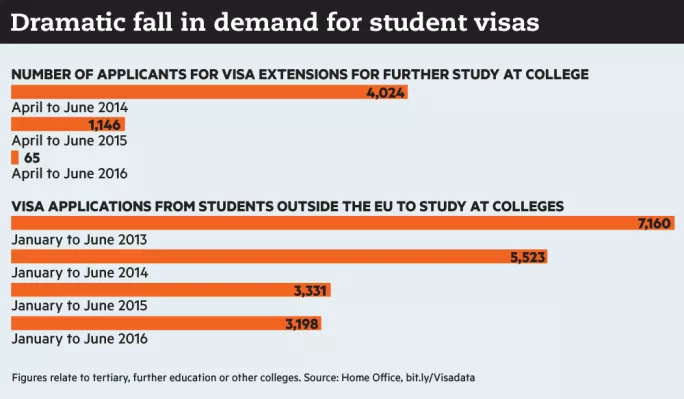Visa numbers plunge as non-EU students flee

The number of college learners from outside the European Union applying to extend their studies plummeted by more than 94 per cent in the run-up to the EU referendum, analysis by TES reveals.
According to statistics from the Home Office, only 65 students applied to have their visa extended between April and June, compared with 1,146 during the same period in 2015.
The latest official figures also reveal that the number of visa applications sponsored by colleges in the first half of the year fell to 3,198 - 4 per cent down on last year and less than half the 2013 number.
College principals told TES that the increase in anti-immigration rhetoric prompted by the Brexit vote had made it increasingly difficult for them to attract overseas students, raising concerns over the future of the international market, worth an estimated £100 million a year to the sector. About 160 colleges currently recruit students from abroad.
In recent years, the government has tightened visa rules for international students in a bid to curb immigration and crack down on bogus colleges. This, colleges say, has made it more and more difficult for legitimate institutions to obtain Tier 4 sponsor status - a requirement for sponsoring and recruiting students from outside the EU.
Principals warned that the way the UK was viewed overseas as a result of Brexit could result in the international student market becoming even more challenging.
Tim Proud, assistant principal at Itchen Sixth Form College in Southampton, said the college had originally recruited international students to introduce greater cultural diversity, but this had evolved into a strategy to bring in additional income. “It has gone from an option to a necessity,” he added.
In 2007, it raised £239,000 from international students (3.5 per cent of total college income); in 2016, this figure stands at £1.25 million (13.3 per cent of total income).
“If we didn’t have that, we would be in the same position as everyone else. Everyone is restructuring, people are losing their jobs or the curriculum is being cut,” Mr Proud said.
‘High-risk strategy’
However, Mr Proud conceded that relying on international recruitment was a “high-risk strategy”, adding: “Brexit and Tier 4 visa changes have made things very difficult…For us to be publicly saying we don’t want any more immigrants [in the UK], and students count as immigrants, strikes me as cutting your nose off to spite your face.”
Chichester College principal Shelagh Legrave agreed that recruitment had become more difficult. “The debate that took place, particularly before deciding whether to leave Europe, was heard internationally via social media, and students feel there are other countries that are more welcoming,” she said.
At the Conservative Party conference in October, home secretary Amber Rudd announced a crackdown on the number of overseas students studying “low-quality” courses, arguing that student immigration rules should be “tailored” to course quality.
She told the conference: “This isn’t about pulling up the drawbridge. It’s about making sure students that come here come to study.”
Emma Meredith, international director at the Association of Colleges, said that overseas students made a “significant and lasting contribution” to colleges and their local economies. She added that while Home Office regulations had progressively tightened up restrictions, colleges continued to diversify their international activity.
“At a turning point now for the UK’s international relations, our college sector has a huge amount of expertise to offer countries looking to develop their technical and professional education,” Ms Meredith said. “We look forward to growing the work of the college sector internationally.”
A Home Office spokesperson said: “We have cracked down on bogus colleges offering substandard courses by making the sponsorship system more rigorous. All education institutions wanting to recruit international students must demonstrate a strong record of immigration compliance, as well as educational quality. Since 2010, more than 920 institutions have been struck off from being sponsors of international students, having failed to meet these standards.”

You need a Tes subscription to read this article
Subscribe now to read this article and get other subscriber-only content:
- Unlimited access to all Tes magazine content
- Exclusive subscriber-only stories
- Award-winning email newsletters
Already a subscriber? Log in
You need a subscription to read this article
Subscribe now to read this article and get other subscriber-only content, including:
- Unlimited access to all Tes magazine content
- Exclusive subscriber-only stories
- Award-winning email newsletters